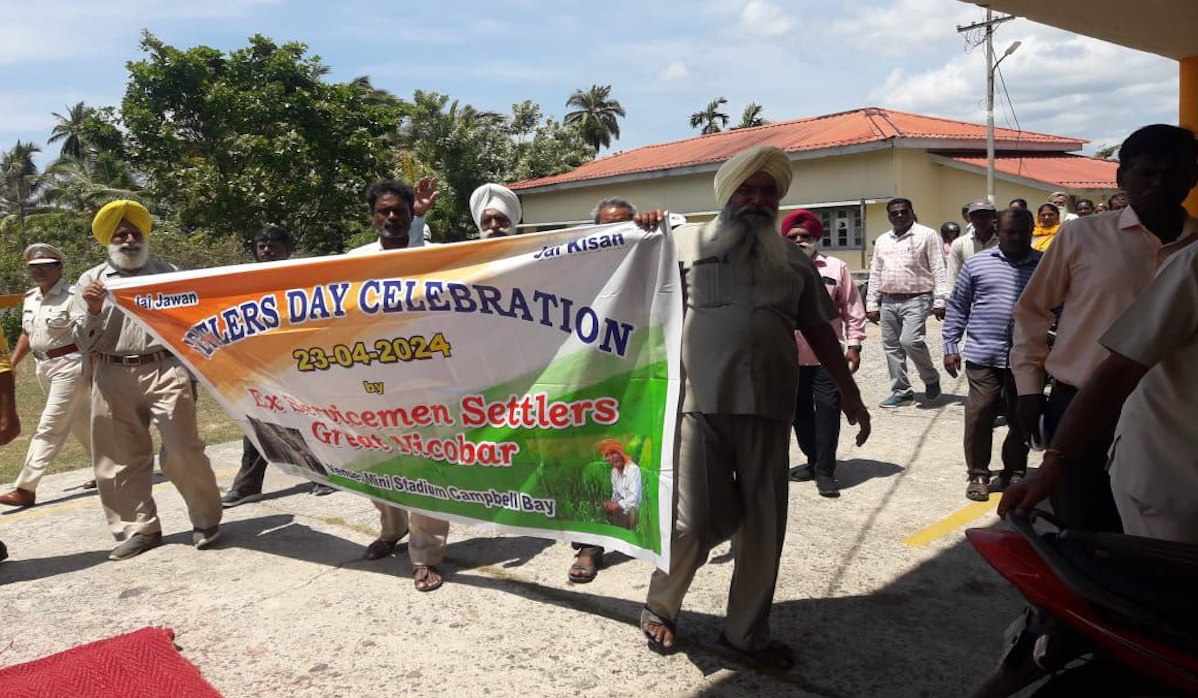Tarun Karthick
Port Blair, 23 April 2024
In a poignant commemoration of history, today marks the 55th anniversary since the arrival of 69 pioneering families of ex-servicemen on the shores of Great Nicobar Island. On April 23, 1969, these families, hailing from various districts of Punjab, disembarked from MV Andamans through a pontoon onto a wooden jetty behind what is now known as the Police Marine Force Building in Campbell Bay.
The journey of these settlers was arduous, starting from Ludhiana Railway Station on April 14, 1969, where they boarded a train bound for Kolkata. From the bustling docks of Kidderpore in Kolkata, the MV Andamans set sail for Port Blair, eventually making its way to Campbell Bay after a brief stopover.
The arrival of these families marked the dawn of a new era for Great Nicobar Island. Their resilience and determination transformed Campbell Bay from a quiet outpost into a thriving town. Over the years, more ex-servicemen settlers joined their ranks in 1970, 1974, 1977, 1979, and 1980, along with 11 families of fishermen.
The challenges faced by the settlers of Great Nicobar were unparalleled, as they established their homes in one of the remotest parts of the Andaman and Nicobar Islands. It was the aftermath of the 1962 Indo-China war that prompted the Indian government to rethink its strategy for Great Nicobar. Recognising the island’s strategic importance, the government initiated the settlement of ex-servicemen, to prevent its occupation by any foreign power.
Today, Great Nicobar stands as a beacon of development, with plans underway to transform it into a major transshipment port. This remarkable progress owes its gratitude to the perseverance, struggles, and sacrifices of the 265 out of 330 Ex-Servicemen Settler families who chose to remain on the island, living their lives in isolation but steadfast in their commitment to their nation’s security.
As Great Nicobar commemorates this significant milestone, the legacy of those pioneering settlers continues to inspire generations, reminding us of the indomitable spirit that shaped the destiny of Great Nicobar Island.


Feeling nostalgic to read this article.Yes for this settlement to happen my father NC Bhimaiah ,then Range Forest Officer ,was deputed to make forest clearance .Along with him my mom NB Lala also landed in Campbell Bay.She made a history by being the first lady to land in the Island
Sad part is that these families are not compensated for the loss during the Tsunami ,because they are not local . They lost everything in Tsunami ,you go and see the barren fields ,which they can’t cultivate because of saltwater ,scattered all over with garbage .Sad story .
This article took me 55 years back. I was one of the cabin passengers of that ship. I was working as a Superintend E/M in Port Blair Deep Water Wharf Project. The ship went to Campbell Bay straight from KG dock Kolkata and after a short stay there we went back to Port Blair. As far as my memory goes Dy Commissioner of A and N was present there and received the Ex army men families there and was looking after there settlement needs.
Thank you for this artcle.
Very big sacrifice by this xservice family who left their home and settled in the remotest part of islands to safeguard these islands from the outsiders countries.I am great to and appreciate these x force. My heartiest congratulations to them.
Only way Forward to Indian & India Security is through this Very Versity of Island Great Nicobar!; as Chinese Continue Aggressive posture in Oceanic Region We As Bharath ( INDIA) Can only Put Our lives to Develop & Redevelopment of Nicobar Islands in Immformidabel fort& Growing Indian NAVEL FORCES THRICE TO THAT OF USA AND FALLOW RULE BASE ORDER IN INTERNATIONAL WATERS?? JAI HIND JAI BHARATH
After all Punjabis. Punjabis where ever yhey have gone and settled they treated it like their motherland and developed the area. Kudos to this race of Sikhs God bless this community. At the same time shame on those who call this hard working and tireless people khalistanis or atankbadi.
Salute to the pioneering settlers. They must have faced unimaginable hardships. I remember visiting GN in 1979